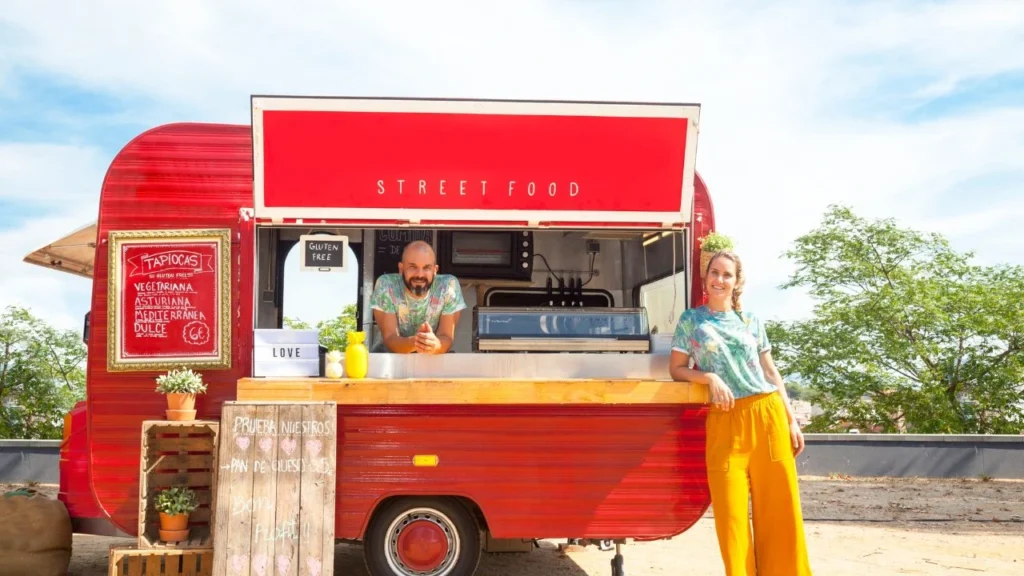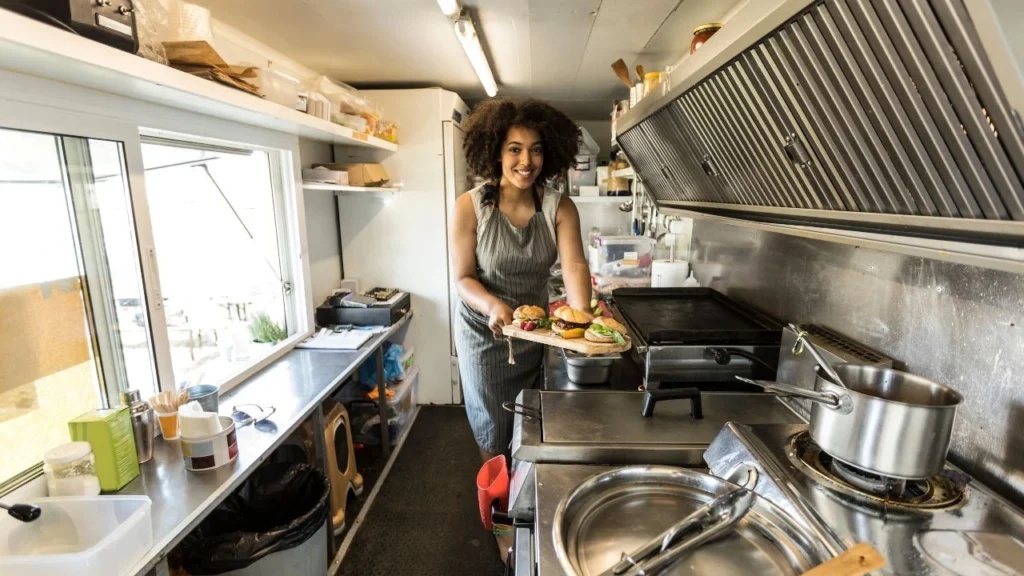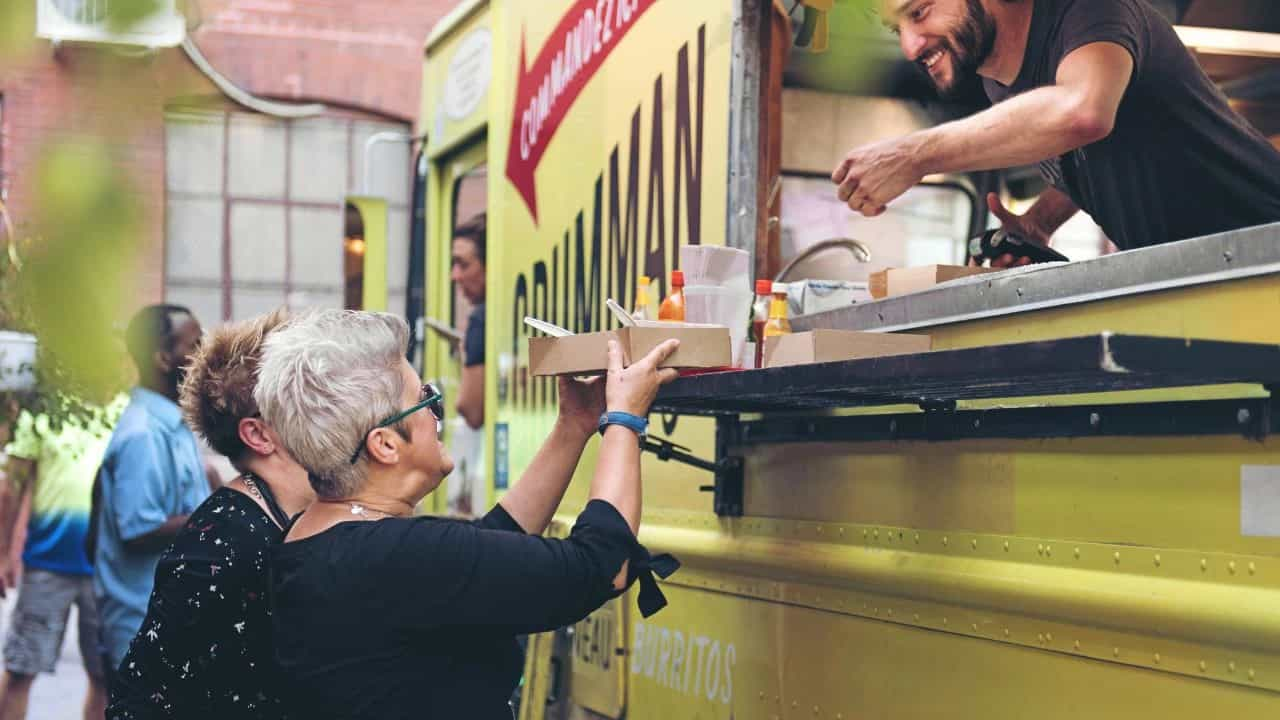The smell of fresh food and the bright colors of a food truck are magical. Starting one is a dream about flavors, faces, and a community on wheels. But, the financial side is key. From the initial expenses to planning your budget, it’s a journey filled with numbers. I’ve navigated these waters before, and I’m eager to guide others.
Dreaming of making incredible dishes in your mobile kitchen? It’s more than just great cooking skills. You need to get ready for the money it takes. Understanding the essential start-up expenses for a food truck business includes everything from buying your truck—$50,000 to $200,000 for a new one or starting at $20,000 for a used one with personality—to other vital expenses for opening up.
Breaking Down Food Truck Start-Up Costs
Customizing your truck for cooking can cost $20,000 to $50,000. Then, licenses and permits range from $500 to $3,000. Initial food supplies can slightly push your budget by $1,000 to $5,000. Plus, don’t forget about $1,000 to $5,000 for marketing and making your truck stand out.
Some costs aren’t obvious at first. Legal fees, insurance, and fuel are just as crucial. Add in staff wages, renting kitchen space, and truck upkeep. Suddenly, the financial needs become very real. Despite the costs, owning a food truck also means investing in freedom, creativity, and the community you’ll serve.
For those ready to take their food idea on the road: Paying attention to startup costs and budgeting correctly is key. Managing your ongoing expenses will help you succeed. This path lets your passion bring profits, and I’m here to guide you through it.
Vehicle Costs: The Foundation of Your Business
Starting a food truck business means you’ve got to understand money matters. Getting your food truck is often your biggest expense. This cost depends on the truck’s model, condition, and how it fits your kitchen needs.
New Trucks: What to Expect
Choosing a new food truck lets you design your kitchen your way. But, these trucks cost between $50,000 to $175,000. You get to decide on the layout that best fits your cooking style and equipment. Finding the money for this might mean getting loans or leases designed for food entrepreneurs.
Used Trucks: Budget-Friendly Alternatives
Buying a used food truck can cut your starting costs, with prices from $30,000 to $100,000. Make sure to check the truck well and be ready to update it as needed. This helps avoid higher costs for fixes later on.
Truck Rentals: Testing the Waters
Renting a food truck is perfect for new entrepreneurs. It means not paying a lot upfront. With rent between $2,000 to $3,000 a month, you can try out locations and menus. Plus, you won’t have the costs of owning, like fixing and losing value over time.
Pro Tips for Choosing the Right Vehicle
- Match your truck to what your menu needs—think about room for your cooking gear and where to keep things.
- Look at your budget to see if buying new, used, or renting is best. Funding options can help make a smart choice that balances cost and what you need from the truck.
- Plan for regular maintenance to avoid big repair costs later. Remember this in your business plans.
Kitchen Equipment: Outfitting Your Mobile Kitchen
Setting up a top-notch food truck kitchen is key for starting chefs on wheels. It’s important to fit the setup to your budget and needs. The cost can vary a lot, so know what gear you must have and what you can skip. Incorporating items like a fry-oil conditioner or a fry-oil filter can improve oil efficiency and food quality, making a significant impact on your start-up journey.
Essential Cooking Appliances
- Commercial grade stoves and ovens
- Grills and fryers for diverse menu options
- Energy-efficient appliances to cut down on utility costs
Refrigeration and Storage Needs
- Adequate refrigeration units to ensure food safety
- Compact shelving solutions to maximize space
- Secure storage for perishable and non-perishable goods
Prep Stations and Smallwares
- Ergonomic work tables and cutting surfaces
- High-quality knives and cooking utensils
- Portable sinks and water supply systems
Pro Tips for Saving on Equipment Costs
- Consider leasing food truck equipment to spread out expenses.
- Buy used or refurbished kitchen appliances to save money.
- Build custom solutions for simple needs to keep costs low.
- Negotiate for bulk discounts or extras when purchasing equipment.
- Look into tax incentives and deductions for small businesses.
- Optimize operations with tech solutions like digital ordering systems.
Making smart choices on your budget is crucial for a food truck’s start. Focus on essential items and think about renting or buying used equipment. This approach helps you create a kitchen that’s both effective and doesn’t break the bank.
Licenses, Permits, and Insurance: Staying Compliant

Starting a food truck means dealing with many legal steps. It’s important to know about different licenses, permits, and insurance. Getting this right is key to running your food truck legally and smoothly. These rules make up a big part of your costs but are vital.
Business Licenses and Health Permits
- First, you need a Business License to operate. This cost varies by location, from $50 to hundreds of dollars.
- A Health Department Permit checks if your food truck meets safety standards. It’s key for keeping customers safe and trusting your service.
- You might also need a Food Handler’s Permit and a Fire Department Permit. They make sure your team can safely handle food and deal with emergencies.
Vehicle Licenses and Parking Permits
Running a food truck also means sorting out how and where you can move and park:
- A Commercial Driver’s License (CDL) might be needed, depending on your truck and the law.
- You must register your vehicle according to state laws. Safety inspections help you avoid legal issues.
- In many places, where you can park your food truck is strictly controlled. You need to know the zoning laws well.
Insurance Requirements for Food Trucks
- Insurance for your food truck is a must. It helps cover risks and liabilities of running a mobile food service.
- General liability insurance protects against injuries or damages to others. Commercial auto insurance covers your vehicle and team while on the road.
- And if you have employees, you’ll need workers’ compensation insurance. It covers injuries that happen at work.
Pro Tips for Navigating Local Regulations
Understanding local laws is as diverse as food truck menus. Here are tips to keep you ahead:
- Connect with local food truck groups or get advice from legal experts. They specialize in food service and mobile business laws.
- Use a licensed commissary kitchen. This helps meet health codes when your truck isn’t on the street, a common rule.
- Keeping your permits and licenses updated through regular inspections and renewals is crucial. It keeps you in line with local laws on food safety and business operations.
Branding and Marketing: Building Your Identity

Establishing a strong identity is vital in the food truck world. A well-branded food truck grabs attention and keeps customers coming back. It’s important to impress at first glance and maintain that image both in person and online.
Successful food trucks catch eyes with their design and stay connected through social media. This mix of visual charm and online savvy is key.
Truck Wraps and Logo Design
A memorable logo and striking truck wraps are the heart of food truck branding. They not only draw eyes but also make a lasting impression. Investing in top-notch design helps your food truck stand out in a crowded market.
Creating a Digital Presence
Growing your food truck requires a strong digital approach. An engaging online presence helps you reach more people. Through social media and a great website, you can share updates and keep customers informed.
Marketing Materials and Community Engagement
- Creating flyers, menus, and promo items boosts awareness and complements online marketing.
- Joining events and festivals increases visibility and connects you with potential customers.
Pro Tips for Affordable Branding Strategies
- Take advantage of social media to increase visibility affordably.
- Invest in branded packaging to advertise on the go.
- Partner with local entities and influencers to expand your audience.
Inventory and Supplies: Stocking Up

Entering the mobile culinary world means understanding food truck inventory, expenses, and budgeting. It’s crucial for success. Good planning can cut costs and make your operations smooth. This will help your food truck stay ahead and earn profits.
Food Ingredients and Packaging
When starting, you’ll focus on getting the right ingredients and packaging. This could take up a big part of your budget. Think about the following:
- Versatile Ingredients: Choose ingredients you can use in many dishes. This helps avoid waste and saves money.
- Bulk Purchases: Buying in bulk saves money. It works well for items you use a lot or non-perishables.
- Eco-friendly Packaging: Customers care about the environment. Using biodegradable or recyclable packaging can make your brand more attractive.
Cleaning Supplies and Office Essentials
Hygiene and efficient management are key in the food business. Make sure you have these to keep your truck clean and organized:
- Sanitizing Chemicals and Tools: You’ll need plenty of cleaning supplies and tools to keep things sanitary.
- Office Supplies: Smooth running requires good management. Items like cost-effective POS systems are important.
Pro Tips for Managing Inventory Costs
Smart inventory management helps balance expenses and profits:
- Inventory Tracking: Use software to monitor inventory. This prevents overstocking and helps replenish popular items.
- Supplier Relationships: Good relationships with suppliers can get you better prices and deals, which is great for your budget.
Efficient inventory management is key. It helps food truck owners cut waste, manage expenses, and use their budget well. This leads to success and sustainability.
Financing Options and Contingency Planning
Starting a food truck requires looking into different ways to finance it and having a backup plan. This makes sure you have the money needed and can handle unexpected money problems.
Small Business Loans and Crowdfunding
For funding a food truck, small business loans like those from the SBA are a big help. They have good terms. Also, crowdfunding lets you get money from supporters, making your brand known and building customer loyalty from the start.
Grants for Small Business Owners
Grants are great because you don’t have to pay them back. This eases the financial stress on new owners. With grants, you can focus more on buying kitchen gear and stocking up without worrying about the costs.
Pro Tips for Budgeting and Contingency Funds
- Regularly update your financial projections to reflect real-time operational data and market conditions.
- Implement a rigorous budgeting process using financial planning software to automate reports and reduce human error.
- Establish a dedicated emergency fund for unforeseen business and personal expenses, ensuring operations can continue smoothly during unexpected events.
- Conduct break-even analysis to identify the minimum sales target needed to cover all operational costs.
- Engage in sensitivity analysis to test different financial scenarios and adjust strategies accordingly.
Learning and applying these financial tips is key to starting a food truck. They help ensure it can grow and last a long time.
Ongoing Costs: Keeping the Truck Rolling

Managing ongoing food truck expenses is just as important as your first investment. Let’s explore the key parts of recurring costs.
Fuel Costs for Daily Operations
Fuel is a big daily cost for food trucks. Whether you use diesel to drive or propane to cook, these expenses directly impact your profits. Planning your routes well and maintaining your vehicle can help lower these costs, which is vital for reducing food truck business expenses.
Maintenance and Repairs
It’s crucial to keep your food truck running smoothly. Sudden breakdowns can mean lost sales and high repair costs. Regular maintenance not only cuts reducing food truck business expenses over time but also keeps your mobile kitchen safe and reliable.
Utilities and Operational Expenses
Utilities like water and electricity, along with costs for ingredients and serveware, are essential to your daily operations. Using energy-efficient appliances and eco-friendly practices can greatly reduce these expenses.
Pro Tips for Reducing Ongoing Costs
- Utilize energy-efficient appliances to cut down on utility costs.
- Schedule regular maintenance to prevent costly repairs.
- Plan routes efficiently to save on fuel costs.
- Keep an eye on inventory to ensure that you are using supplies without waste.
By applying these tips, you can control your food truck costs better. This will make your business both more efficient and more profitable.
Budgeting for Success: Your Roadmap to Profitability
For those starting a food truck, making a strong financial plan is key. As the market gets better after the pandemic, planning your money is critical. Starting your venture means mixing good value with great food to attract budget-aware customers.
Steps to Create a Detailed Budget
Beginning with your budget is about comparing expected earnings with possible costs. It’s vital to accurately forecast. Think about start-up costs, like buying the truck and getting kitchen supplies. Also consider ongoing costs, such as ingredients and upkeep. Balancing top-quality food and cost efficiency leads to profit. This approach is essential for a successful food truck business.
Prioritizing Essential Expenses
Finding the right things to spend money on is crucial in the food truck world. Focus on local ingredients, creating new menu items, and going to busy events. These key investments help your brand last and become a beloved local spot.
Regularly Adjusting Your Budget
Being smart with money means being ready to change. Your budget should adjust to market and customer changes. Include seasonal items and holiday specials while keeping costs low. This keeps your business healthy. Always tweak your spending to find the perfect balance.
Pro Tips for Tracking Financial Growth
In the fast-paced food truck business, it’s important to keep an eye on your money. Use data to guide your business. Look at what’s working by tracking your goals and wins. Use your online success and customer data to make smart decisions. Aim for happy customers and a growing business.
FAQ
What are the latest statistics on food truck industry growth and average startup costs?
The global food truck market is projected to reach USD 8.78 billion by 2033, growing at a CAGR of 6.7% from 2025 to 2033. Average startup costs for a food truck typically range from $100,000 to $250,000, including the truck, permits, equipment, and inventory.
What are the current price ranges for new and used food trucks in 2025?
New food trucks typically cost between $50,000 to $175,000, while used food trucks range from $30,000 to $70,000. The price varies depending on factors such as size, equipment, and customization options.
What is the average cost breakdown for essential kitchen equipment in a food truck?
Kitchen equipment costs for a food truck generally range from $25,000 to $100,000, depending on the condition of the truck and specific needs. This typically includes basics like knives, cutting boards, pots and pans, food processors, blenders, storage containers, ovens, and food prep surfaces.
How do licensing and permit costs vary by state or city for food trucks?
Licensing and permit costs for food trucks can vary significantly by location. For example, costs range from $590 in Minneapolis to $2,439 in Los Angeles, and up to $17,066 in Boston. These fees can include business licenses, health permits, and vehicle-related permits.
What are the most cost-effective branding and marketing strategies for new food trucks?
The most cost-effective branding and marketing strategies for new food trucks include maintaining an active social media presence, creating eye-catching truck designs, and participating in local events. Additionally, implementing loyalty programs, collaborating with other businesses, and utilizing email and SMS marketing campaigns can be highly effective and budget-friendly options.
Resources
https://straitsresearch.com/report/food-truck-market
https://pos.toasttab.com/blog/on-the-line/how-much-does-a-food-truck-cost
https://www.shopify.com/blog/how-much-does-a-food-truck-cost








